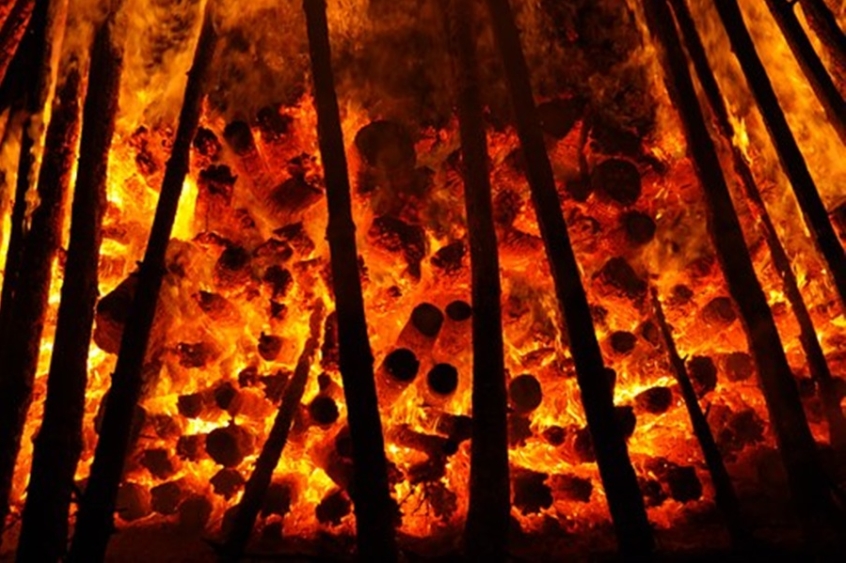Can an atheist go to heaven? Categorically not, is the traditional answer. Heaven is reserved for those who have repented of their sins and trusted in Jesus Christ as their personal Saviour and Lord. And more than this: if you haven't done that, when you die you are going to hell, where you will suffer Eternal Conscious Torment (ECT) – quite literally burning for ever and ever.
This is the default position for most evangelicals, and it forms an uncomfortable though largely unacknowledged background to evangelical church life. In most churches, I suspect, people don't think about it too much, and there's probably a good deal of underground universalism or 'salvation by works' theology going on: hell, surely, is reserved for really bad people, and God will find a way to save the nice people – our own families, for instance.

For full-blooded conservatives, this is anathema. God is righteous; sin is awful; the astonishing thing is not that God sends the majority of people who have ever lived to hell, but that he condescends to save some.
Well: maybe. But what's missing from this account, all too often, is an acknowledgement of the huge pastoral and ethical problems it throws up. And these were thrown into sharp relief by an encounter Pope Francis had with a young boy. Emanuele wanted to ask a question when the pope visited a catechism class, but burst into tears at the microphone. Francis invited him closer. His atheist father had died. Was he in heaven or in hell?
It's that sort of question that ought to pierce the heart of Christian pastors like an arrow – and it pierced the heart of Francis. Emanuele's father was a good father and a good man who had his children baptised even though he was not a believer. 'God has a father's heart, your dad was a good man, he's in heaven with him, I'm sure.'
Compare that response with, say, John Piper's, who when asked how to explain hell to a six-year-old child who was worried about it, said: 'Don't miss this golden moment of using the fear of hell as a means of clarifying and establishing the truth of 1) a great and glorious God, 2) a horrible nature of sin, 3) the reality and justice of future judgment, 4) the greatness of the cross and Christ's rescue from hell, and 5) the glory of a fearless life of faith.'
Now, it should be said that this isn't just a Catholic/evangelical split. Pope Francis has been furiously assailed by conservative Catholics who think he's wobbly on hell (among other things) and lots of evangelicals would quail at Piper's steely rationalism.
But their two approaches do contrast very markedly. For Francis, hell is a problem. For Piper, it's not. We are not to question God, because what God does is right by definition. As another pastor of his mind, JD Greear, says on The Gospel Coalition website: 'We may be tempted to rage at God and to correct him. But how can we find fault with God?... When we look back on our lives from eternity, we'll stand amazed not by the severity of his justice, but by the magnanimity of his mercy.'
This is strong stuff. But once again, it doesn't come close to answering the question of people like Emanuele. How can believers possibly be joyful in their own salvation, knowing that an unbelieving mother or father, a husband or wife, their own children, after a few decades on earth, will suffer eternal conscious torment in hell?
One theologian who faced this honestly was Puritan hero Jonathan Edwards, who in an oft-quoted sermon said the pleasures of the blessed were actually enhanced by watching the torments of the damned. 'When they shall see how miserable others of their fellow creatures are, who were naturally in the same circumstances with themselves; when they shall see the smoke of their torment, and the raging of the flames of their burning, and hear their dolorous shrieks and cries, and consider that they in the meantime are in the most blissful state, and shall surely be in it to all eternity; how will they rejoice!'
Try telling that to Emanuele.
Now, not every account of hell – even of the ECT variety – is quite as robust as this. But if those who honestly believe that is what the Scriptures teach want to maintain the credibility of their witness to a God of love, they must at the very least acknowledge that hell raises questions to which they don't really have an answer.
Is it, in fact, what the Scriptures teach? That's a larger question, but many evangelicals would argue that it isn't. Some, like Robin Parry (The Evangelical Universalist) argue that God will save everyone. Others, like the late John Stott, adhere to conditional immortality – the idea that when a non-believer dies they simply pass out of existence. Interestingly, an Evangelical Alliance report from 2000 concluded that the latter represented a 'significant minority evangelical view', and that it 'fell within the parameters set by the 1970 Basis of Faith'.
What ought to be clear, though – and all too often it isn't – is that hell, as a subject, is one to be approached with fear and trembling. Human beings are not pawns in a theological game. They're people like Emanuele's dad.
Follow Mark Woods on Twitter: @RevMarkWoods













